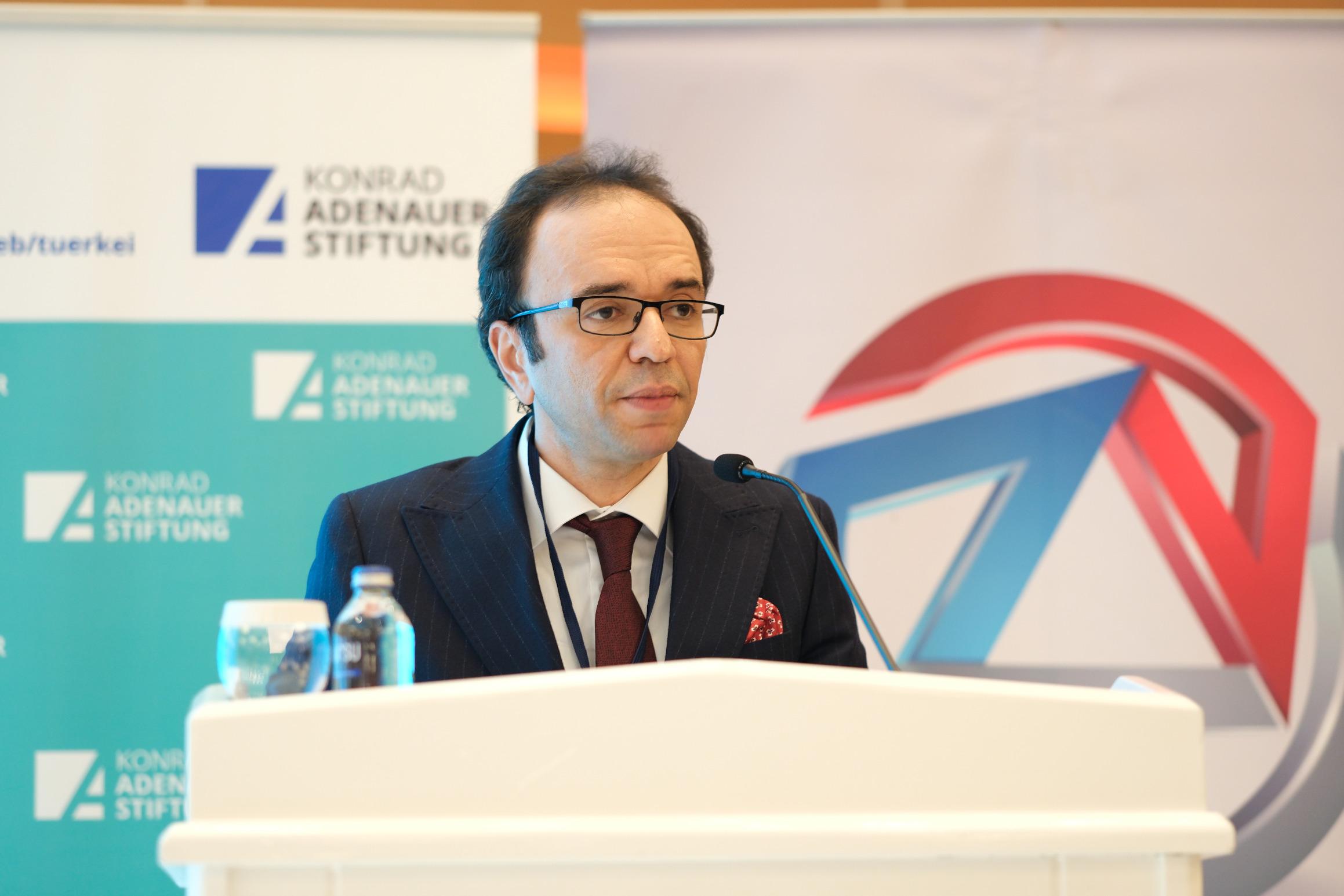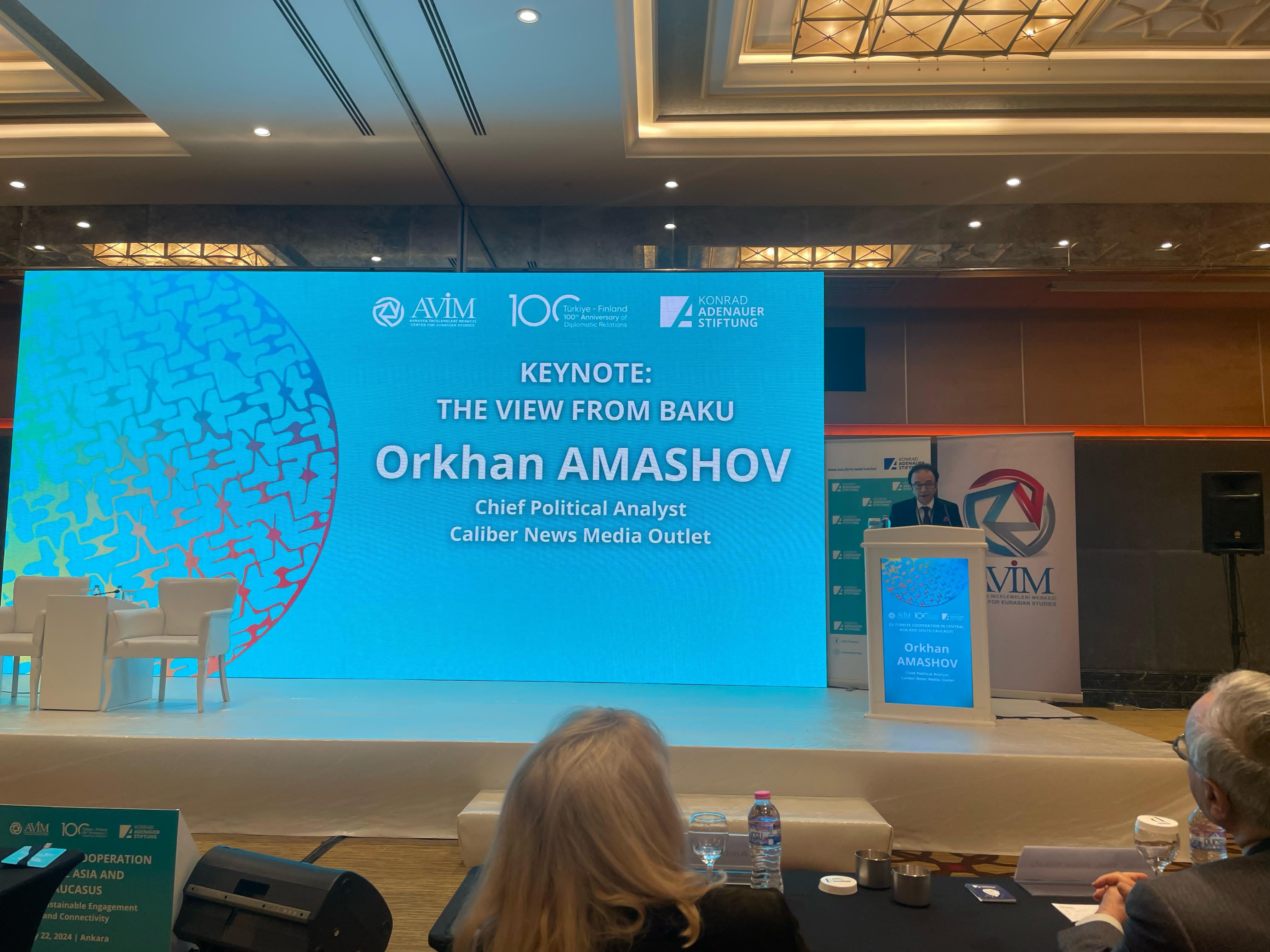Failure to address connectivity imperils Azerbaijan-Armenia peace process South Caucasus’s growing geopolitical autonomy
Caliber.Az expert Orkhan Amashov contends in his keynote speech at the "EU-Türkiye Cooperation in Central Asia and South Caucasus Conference" that peace between Azerbaijan and Armenia is unattainable until the major challenges leading to the unlocking of the region's connectivity potential are addressed.
Connectivity, if not defined with precision, could be an empty piece of terminology. But this is manifestly not the case when it is understood in its precise contours and in light of a certain concrete context, be this regional or global. And the politics of connectivity is of a more specific and definable nature, involving competing narratives contingent upon often differing interests. The intersecting issues of sovereignty, security, containment and sometimes even coercion are quite often inextricably intertwined.
The geopolitics of the South Caucasus, to be more precise, its intra-regional dynamics, have perceptibly changed as of November 2020, when Azerbaijan emerged victorious from its war with Armenia, restoring its territorial integrity after three long decades. This outcome had been anticipated by many, including the esteemed Dr Gerard Libaridian, who spoke earlier. A prospective and long-awaited peace between Azerbaijan and Armenia is imbued with the hope that a rule-based and inclusive connectivity, giving rise to sustainable growth, may indeed be in the offing for the South Caucasus.
The kaleidoscope of regional connectivity was also shaken, with some pieces of potential future transportation linkages currently remaining in flux; they will be settled at some point, and I will return to that in the fullness of time.
The ripples of the sea change effect produced by the Second Karabakh War for the South Caucasus, which shifted the centre of regional gravity towards Baku, thereby also, increasing Turkish influence in the region, was further exacerbated by virtue of the implications of Russia’s invasion of Ukraine, which disrupted supply chains, causing food shortages and an increase in commodity prices due to the Russian-controlled east-west routes becoming no longer reliable.
The latter has further propped up the argument that the Trans-Caspian International Transport Route, also known as the Middle Corridor, could serve as the fastest and shortest route connecting Europe with China. Despite being confined to multi-modality, transit time from Shanghai to Europe via the Middle Corridor would be 4750 km, 500 km of which will be via the Caspian Basin, taking a mere 10 days. This presents serious advantages over the Northern Route, traversing Russia, and the Southern Sea Route, via the Suez Canal, currently impacted by the Houthis, both in time, risk and transit time.

The cumulative impact as far as can be assessed at this juncture, of these developments has increased the essential connectivity value of the South Caucasus. This is how the existing realities and potentialities appear to many in Baku.
And it is in this context that the discourse of the politics of connectivity is presently being shaped in Azerbaijan.
Perhaps the main element that defines today’s discourse is our perception of self, which is no longer viewed as mere linkage, however important, in the wider east-west global network, but as an orbit in its own right, around which surrounding regional dynamics could be shaped to an extent.
This is what some call “Caucasus plus”, viewing the region as an indispensable epicentre. This corresponds with the potentially growing geopolitical autonomy of the South Caucasus, with its constituent members having acquired an opportunity to punch above their respective weights, if the requisite regional inter-connectivity is achieved. This provides enhanced opportunities for the ability of the region to manoeuvre between the different connectivity agendas pursued by various actors.
As stated hitherto, the connectivity kaleidoscope of the South Caucasus has been shaken. Certain pre-existing elements - such as energy pipelines connecting Azerbaijan via Georgia with Türkiye and thereafter to Europe are deeply embedded and secure. However, some elements of potential future linkages are in flux. Before they are settled, all regional actors want to reorder them around their own interests. There is competition between Azerbaijan and Armenia regarding this.
Pashinyan’s “Crossroads of peace” initiative and Azerbaijan’s agenda, incorporating The Zangazur Corridor, a proposed overland unimpeded passage connecting mainland Azerbaijan with its Nakchivan exclave, are viewed as being at loggerheads, but they are not necessarily mutually exclusive.

A post-2020 landscape facilitates, for the first time, the implementation of the ambitious agenda for unblocking communications between Azerbaijan and Armenia, and this could and indeed should be the pillar of sustainable and durable peace, contributing to building mutual trust.
The USD64,000 question is what sort of interconnectivity would serve the region best. It should be naturally rule-based and decided solely by Baku and Yerevan. However, the sides have already agreed on some rules, their interpretation having proven not to be identical.
We must now address Article 9 of the 10 November 2020 tripartite statement agreed between the sides, with Russia also being a signatory, which mandates that Armenia is obliged to provide unimpeded access for Baku, allowing it to connect its mainland territory with the Nakchivan exclave. Two points of a contentious nature are worthy of examination; a) how unimpeded the access should be and b) who should control the route traversing Southern Armenia.
Both issues are closely related with sovereignty. Azerbaijan’s view is that the unimpeded nature of this overland passage implies that goods, cargo and persons travelling from Azerbaijan proper to Nakchivan, in other words, from Azerbaijan to Azerbaijan, should not be forced to undergo any customs clearance or border inspection, whereas if the final destination of goods, cargo and persons is a third country, for instance, Türkiye, then all border and customs arrangements should be implemented.
The second issue concerns the question of administering control over the route. Article 9 clearly states that this should be exercised by the Border Guard Troops of the Federal Security Service of Russia. However, Armenia does not want to concede the control element to Russia, regarding this as further diluting its sovereignty, thus having already been significantly curbed. This is fundamentally a matter between Russia and Armenia, but the finalised route will need to be secure to satisfy Azerbaijan.
For the sides to move forward from the present state of affairs, a new normative framework should be adopted. If the idea of ditching Russian control is an absolute must, then Baku and Yerevan could work out a bilateral arrangement. Any arrangement should be based on common sense with knobs on. And the finely-carved knobs are where details are engraved and inlaid in the finest ivory.

Connectivity binding Azerbaijan and Armenia should also serve their interdependence and be based on reciprocity, by extension, leading to sustainable endemic growth.
The view in Baku is that if Armenia facilitates unimpeded access via Zangazur, then Baku will consider the option of installing the self-same regime for persons, goods and cargo moving from Armenia’s southernmost territory to the rest of the country via Azerbaijan’s Nakchivan.
A few times over the past few years, and certainly since late 2022, Azerbaijan and Armenia have found themselves on the precipice of a long-awaited peace and, on each single occasion, hopes have been dashed asunder, causing mutual accusations to be expostulated by the involved parties. It is now evident that by not addressing the key issues leading to the unleashing of the region’s connectivity potential, peace between these two nations is impossible. And what is also clear is that Azerbaijan and Armenia have never been so close to forging a final peace, for the past major obstacle - the full restoration of Azerbaijan sovereignty over Karabakh - is no longer there. We have reason for cautious optimism.








